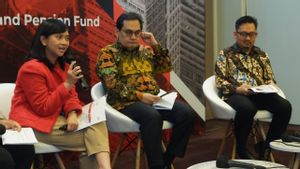JAKARTA - The proposal to separate TikTok Shop from the social media application TikTok continues to be discussed today. This has been expressed by the Minister of Cooperatives and SMEs (Menkop UKM) Teten Masduki and President Joko Widodo (Jokowi).
When reviewing the development of IKN Nusantara some time ago, President Jokowi also believed that TikTok should only act as social media, not concurrently running an e-commerce business. This is in line with the existence of the TikTok Shop which is considered to be the main trigger for the quiet business of traders at Tanah Abang Market, Jakarta.
Regarding this, Institute for Development of Economics and Finance (Indef) researcher Nailul Huda believes that the ban on trading activities on social media is actually a backward step that hinders the digitalization of MSMEs.
Because, said Huda, based on data from the Central Bureau of Statistics (BPS), social media is the second most widely used platform by MSMEs to sell online.
The first position is occupied by instant messaging platforms, such as WhatsApp and Facebook. Then, for the third and fourth positions, namely e-commerce or marketplace and website.
"So, I can interpret that if social media is prohibited for selling, it cuts off one step for MSMEs to go digital and is a step back from the government," said Huda when contacted by VOI, Monday, September 25.
Huda said that social commerce is something that cannot be completely prohibited because interactions on social media cannot be regulated whether it is buying and selling or other interactions.
According to him, instead of banning TikTok Shop, the government should regulate social commerce so that it is equal to e-commerce and offline traders in physical markets. With equal rules, it is hoped that a level playing field will be created.
Apart from equivalent regulations, restrictions on imported products are also needed to protect local products. For example, establishing regulations that apply disincentives to imported products, and conversely, providing incentives for local products, as well as imposing taxes and so on on imported products is crucial for implementation in social commerce.
"So, there should be regulations for social commerce that are equated with e-commerce because in principle, they both sell using the internet," said Huda.
"In 2019, I said that social commerce will be more difficult to regulate because it is not tied to application companies. There will be many loopholes there," he added.
As previously reported, a number of traders at Tanah Abang Market, Jakarta, complained that their sales had dropped sharply recently.
They also protested and asked the government to close the TikTok Shop. They expressed this to the Minister of Cooperatives and SMEs (Menkop UKM) Teten Masduki during a visit to Tanah Abang Market, on Tuesday afternoon, September 19.
VOIR éGALEMENT:
Anton (36), one of the traders at Tanah Abang Market, said that the TikTok Shop had greatly harmed traders in Tanah Abang. Because the prices offered on this platform are very cheap compared to malls and Tanah Abang Market.
"Yes, ask the Minister for help, online shops, TikTok, which has a big influence on traders here, can (please find) a solution," said Anton to reporters.
He considered that the prices at the TikTok Shop were very cheap and unreasonable.
Another trader named Anggi (31) also complained about the same thing. He asked the government to immediately close the TikTok Shop because its sales turnover dropped drastically.
"The turnover has decreased by 80-90 percent. Usually my (income) is IDR 40-50 million, now it's difficult to get IDR 1 million," she said.
The English, Chinese, Japanese, Arabic, and French versions are automatically generated by the AI. So there may still be inaccuracies in translating, please always see Indonesian as our main language. (system supported by DigitalSiber.id)
















